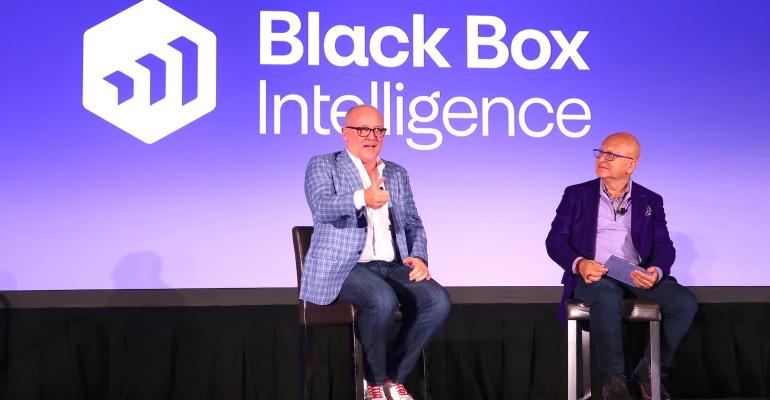From helping incarcerated youth to feeding the hungry during both natural and manmade disasters, restaurant operators have built and nurtured communities amid many hardships, a panel at the Black Box Intelligence Best Practices conference related.
Moderated by Fred LeFranc, CEO and founder of Results Thru Strategy, the panel included: Chad Houser, founder and CEO of Café Momentum; Scott Lawton, CEO and co-founder of Bartaco, and Rob Wilder, chief strategy officer and co-founder of the José Andrés Group, formerly known as Think Food Group.
The panel also featured details about how Bartaco, emerging out of the pandemic, turned the restaurant pay model on its head.
“This was not a master plan,” Lawton recalled. “It was more an accident that turned our really right.”
When the pandemic hit in March 2020, Bartaco kept its managers and cooking staff to accommodate off-premises sales, Lawton recalled.
It brought back waiters as the pandemic allowed opening dining rooms, Bartaco, which had relied on customer card orders, deployed a “Frankenstein version” with quick-response codes. The process resonated with customers, Lawton said.
As gratuities were shared between front and back of house, Bartaco saw its kitchen staff get a $35% pay increase.
“They were making $23 an hour on average,” Lawton recalled. “It was life changing. … They were they didn't have to work second job. They were able to spend time with their children. They were able to send more money home to their families.”
Lawton said Bartaco’s front-of-house changes called for adding a new position, called “service leader,” but the brand was able to cut overall front-of-house staffing by about 30%.
“The service leader is an entry level manager,” Lawton explained. “They made 55,000 plus a 401(k) with a match plus two weeks of vacation plus a bonus that is healthy.” The bonus can be 10% to 20% of the base salary.
Service leaders have zone of the restaurant “where they are there to make sure everyone is happy,” Lawton said. “They're not going to run the food. They're not there so I take the orders.” He likened it to the “geniuses” at the Apple tech-help bar. Wait times for tables have also been reduced, and check averages have increased more than men prices, he added.
Bartaco customers average about 32 years in age and skew about 65% female, Lawton added, and they are very comfortable making orders digitally, and Bartaco has reduced the ordering friction to streamline the increasingly digital experience. Surveys have indicated as much at 85% customer acceptance for the ordering platform, Lawton added.
LeFranc said Bartaco and Lawton also “built a net” for restaurant workers, including contributions to health care.
Panelists also included Houser, who started Café Momentum, which is staffed by 15- to 19-year-old justice-involved youth.
Dallas-based Café Momentum provides a 12-month curriculum with wrap-around services. “In addition to working in the restaurant and gaining life skills and social skill experience working through all the stations,” Houser explained, “we also have a community services center where what we provide 24/7 case management.
“We provide mental health services,” he added “And we also a school, so we're able to provide education services. We went from having a 54% dropout rate to 100% graduation rate.”
Café Momentum, with works with the National Football League players, will be headed to the Super Bowl, doing food truck activations, Houser said.
The effort has expanded, with Café Momentum expected to open March 1 in Pittsburgh, Pa., and is doing programming with youth in Nashville, Tenn. Houser said Café Momentum is exploring opportunities in Atlanta, Baltimore, Boston, Denver and Houston as well with a goal of creating 30 programs over the next 10 years.
Wilder of the José Andrés Group and its affiliated World Central Kitchen said the company's mission had evolved.
“When we started our restaurant company,” Wilder said, “I guess you could say we were somewhat mission-driven, but our mission was much more local. We were about taking care of our teams, offering universal health insurance before other restaurant companies did back in ‘80s and ‘90s [and] retirement plans when everybody told us that that wasn't possible in the restaurant business.”
World Central Kitchen became an extension of the restaurant group’s work in 2010 after the earthquake in Haiti, Wilder said, and has spread to a wide number of disasters since.
By reactivating local resources and buying locally, Wilder added, World Central Kitchen “restarts not only the food economy and puts people back to work and puts farmers back into the marketplace but it helps rebuild the economy so much faster.”
Wilder noted that the José Andrés Group, which had bitter negotiations with the onetime Trump Hotel in the District of Columbia would be opening on Feb. 8 a new Bazaar by José Andrés restaurant in what has become the Waldorf Astoria Washington.
“It's a joy to be able to walk through the doors of that historic building again,” Wilder told the Black Box Intelligence audience via Zoom.
“Every Bazaar is a little unique to its local surroundings and local cuisine and culture,” Wilder said, “so this one will be a spectacular new addition to the collection.”
Contact Ron Ruggless at [email protected]
Follow him on Twitter: @RonRuggless





